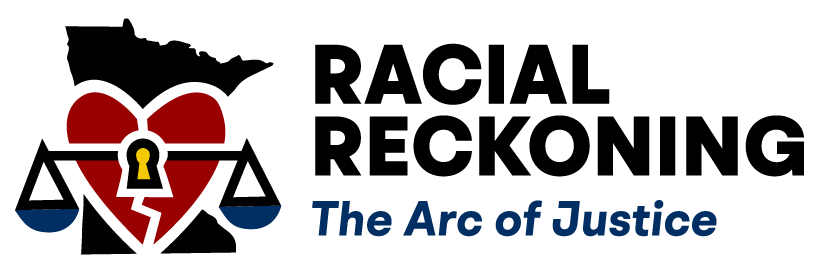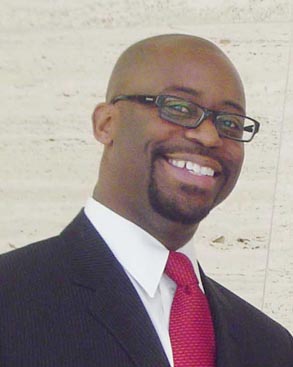During the trial of Derek Chauvin, the world tuned in to watch what was unfolding in a Hennepin County courthouse. The presiding judge in Chauvin’s case was selected by the newly elected Chief Judge of Hennepin County Toddrick Barnette, a Black man – who made history as the first person of color to fill that position. He has worked both as a Hennepin County prosecutor and as a public defender. Tiffany Bui spoke with him about his first year as chief judge.
In a year of difficult decisions, Judge Barnette said his most difficult was to remain quiet after the death of George Floyd. “During social unrest, there were many folks who wanted a statement made,” he said. “I think it was important for us to remain neutral.
You see a community burning, and you see frustration, and you see anger. And that anger is at the justice system. The anger is not just with the police. … It was hard not to be able to address that.”
Barnette said in order to build trust with the community, the workforce needs to be more diverse across the Hennepin County court system. He called employees the biggest ambassadors.
“Me going out to the community only goes so far,” he said. “People are not just going to believe me because I’m a judge, but they will believe someone who works in our system who’s a neighbor, or friend, or relative.”
After George Floyd was murdered, some protesters expressed doubt that Chauvin would even be found guilty. When asked how to bridge mistrust between the public and the legal system, Barnette said the court needs to better educate the media and the public about the legal process.
TB: How have you worked to bridge the gap between the public and the justice system? What do you think has been accomplished and what do you think still needs work?
“We have a group called the Hennepin County Disparity Reduction Justice Strategy Work Group. I know that’s a long name. But we’re able to discuss and address system-wide disparities. And because you have folks there that are decision makers, we’re able to either take that back to our office to deal with, or meet and try to strategize about how we are going to solve a particular issue that impacts disparities.
We have five divisions in our court system. So we have the Criminal Division, which is our largest division; we have civil; we have family; we have juvenile, and we have probate mental health.
We have what we call a judicial retreat twice a year. And that’s with judicial officers, meaning judges and referees, and also our top leaders in court administration. What we’ve done, since I’ve been Chief, our first retreat, what we did was we broke out into those five divisions. And we talked about where in your division, where do you see disparities, or are there areas in which you would like to work on disparities? And then our second retreat, what we did was, we came back to report out, hey, here’s your list of areas that you thought [about], what areas did you touch on and what did you do to address those disparities? So there’s a large effort going on right now across the courts, in which each division is looking at that it’s not just the judges, but you have, you’ll have a supervisor for that division from court administration that can help implement things, change procedures, things like that.
Looking specifically in [each] division is really helpful, because… we have disparities throughout our court system that we need to address.”
TB: The murder of George Floyd has led to more discussions about the need for not just police reform, but criminal justice reform as a whole. And you may have seen some mistrust among committee members about whether courts can actually deliver justice. For example, when an officer gets a sentence that the public doesn’t think is as harsh as it should be. I’m wondering what you make of this as chief judge and kind of what you think can be done to address this mistrust.
JB: You know, I think there’s two big areas for us in addressing mistrust. And it definitely became apparent when the Derek Chauvin trial was coming up. The media plays an important role in the information that people receive. And it’s so important that we make sure that the media understands the process, the legal process, and what’s happening in the courtroom, so that they are reporting it accurately. And I probably wouldn’t have said that before I was chief. It’s not about something that the court’s doing that’s wrong that I don’t want him to report, I just want them to report it accurately, you know, report and understand the process to report accurately. And I think that we have been more open about answering questions, and making sure they understand the process.
The second thing that I think is super important for us, and as the court system, I don’t think that we’ve done a good job at educating the public, in just getting out and just being able to say this, this is the process. This is why this happens this way. And so I think that’s very important for us is to at least educate folks, you can disagree with the end result, but at least understand maybe why a judge can only give a certain sentence or why someone might get bail, and someone might not get bail.
TB: I’m wondering if you can just kind of tell me how you think the social justice movements – the responses to various police shootings, the sort of energy that has generated discussion – how has that affected your work generally?
JB: I think that there’s been a lot of folks who worked on disparity issues in the court system way before me. And they have pushed and pushed and pushed. The momentum at this moment is so great that the voices for change are not just from people of color. It’s also from people where maybe some white folks have been in the minority of speaking up to help in this change, but now, the group as a whole is so much more diverse in asking for changes to be made to improve our criminal justice system.
It’s just not talk, talk, talk, talk, talk anymore. It’s actually hey, discussion, action. And so that’s been so impressive to see, and so impressive to see from elected officials. People have been appointed, who have just been great at saying how can I help this issue? Or this problem be resolved? There might have been some negatives outside of our building, but there have been a lot of positives inside of the building. A lot.
TB: Can you share some difficult decisions you’ve had to make as chief judge, and how you came to your decision in a year of many difficult decisions?
JB: This might be a surprise. The toughest decision, or decisions, I’ve made is to remain quiet or silent after the death of George Floyd, and to remain silent during social unrest. And I think those are two of the toughest ones, when you see so many folks speaking out in support, and speaking out about things they would like to see happen. And I think it was important for me in order to have a fair trial, that nothing I say or do would be a distraction, and nothing from our court system as far as a statement, that there not be a distraction. And there were many folks who wanted a statement made. And I think it was important for us to remain neutral. That’s our job.
TB: Can you talk about why that was a difficult decision for you?
JB: Because you see so much pain from folks in and you see a community burning, and you see frustration, and you see anger. And that anger is at the justice system. The anger is not just with the police. I mean people don’t enter our courthouse and say I only just trust the police. I’m only angry at the police. No, they’re angry at all of us. And it was hard not to be able to address that. And difficult not being able to talk about some of the things that I think were important.
But it was very important that the trials that we’re having – and ethically there’s certain things judges can’t say but it’s just important that that process be on that’s fair.
This interview has been edited for length and clarity.
Subscribe to hear Daily Updates in your podcast feed
- Potter Found Guilty in Death of Daunte WrightAfter three days of deliberation a jury found former Brooklyn Center police officer Kimberly Potter guilty of two counts of manslaughter in the death of Daunte Wright. Feven Gerezgiher reports
- Potter Jury Continues DeliberationsAs jury deliberation continues in the Kim Potter trial, many are evaluating the state of racial justice in Minnesota. We talk to former Hennepin County Chief Public Defender Mary Moriarty. Chioma Uwagwu reports
- Kim Potters’ TearsKim Potter’s crying in court is more than an expression of remorse; it’s part of a history of white women weaponizing their tears against people of color. Tiffany Bui reports.
- Jury Deliberations Underway in Potter TrialThe state’s prosecution and the defense made their closing arguments Monday. Georgia Fort reports.





